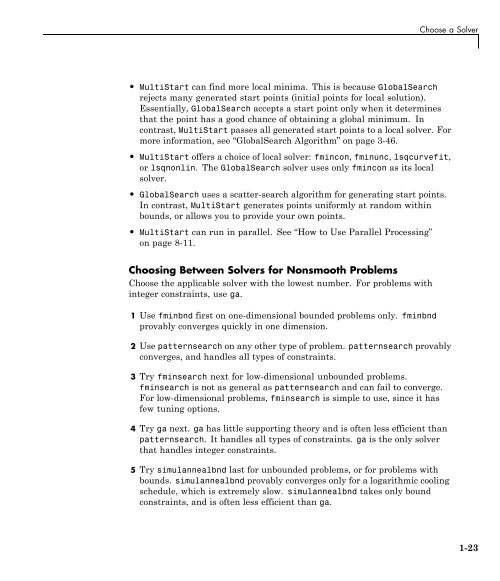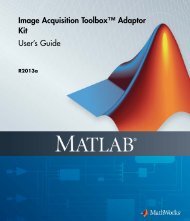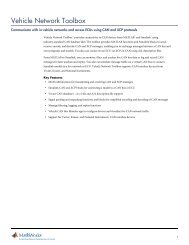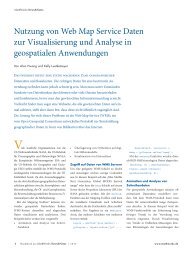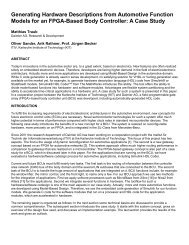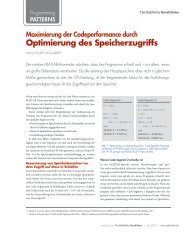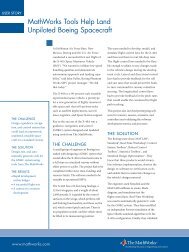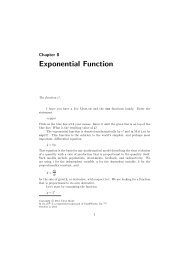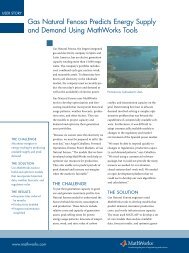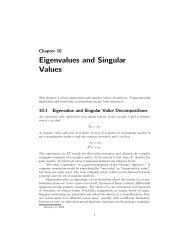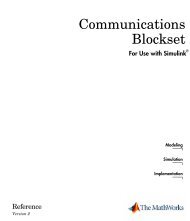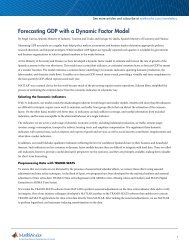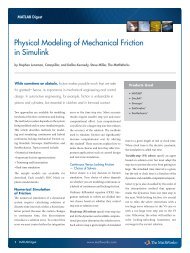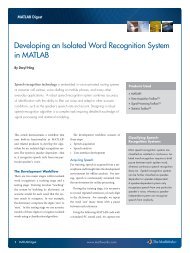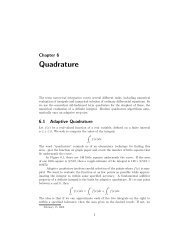- Page 1 and 2: Global Optimization Toolbox User’
- Page 3: Revision History January 2004 Onlin
- Page 6 and 7: vi Contents 3 How to Write a Functi
- Page 8 and 9: viii Contents An Unsuccessful Poll
- Page 10 and 11: x Contents 6 Genetic Algorithm Usin
- Page 12 and 13: xii Contents 8 9 Bibliography .....
- Page 14 and 15: 11 12 A Getting Started xiv Content
- Page 16 and 17: 1 Introducing Global Optimization T
- Page 18 and 19: 1 Introducing Global Optimization T
- Page 20 and 21: 1 Introducing Global Optimization T
- Page 22 and 23: 1 Introducing Global Optimization T
- Page 24 and 25: 1 Introducing Global Optimization T
- Page 26 and 27: 1 Introducing Global Optimization T
- Page 28 and 29: 1 Introducing Global Optimization T
- Page 30 and 31: 1 Introducing Global Optimization T
- Page 32 and 33: 1 Introducing Global Optimization T
- Page 34 and 35: 1 Introducing Global Optimization T
- Page 38 and 39: 1 Introducing Global Optimization T
- Page 40 and 41: 1 Introducing Global Optimization T
- Page 42 and 43: 1 Introducing Global Optimization T
- Page 44 and 45: 2 Write Files for Optimization Func
- Page 46 and 47: 2 Write Files for Optimization Func
- Page 48 and 49: 2 Write Files for Optimization Func
- Page 50 and 51: 2 Write Files for Optimization Func
- Page 52 and 53: 2 Write Files for Optimization Func
- Page 54 and 55: 3 Using GlobalSearch and MultiStart
- Page 56 and 57: 3 Using GlobalSearch and MultiStart
- Page 58 and 59: 3 Using GlobalSearch and MultiStart
- Page 60 and 61: 3 Using GlobalSearch and MultiStart
- Page 62 and 63: 3 Using GlobalSearch and MultiStart
- Page 64 and 65: 3 Using GlobalSearch and MultiStart
- Page 66 and 67: 3 Using GlobalSearch and MultiStart
- Page 68 and 69: 3 Using GlobalSearch and MultiStart
- Page 70 and 71: 3 Using GlobalSearch and MultiStart
- Page 72 and 73: 3 Using GlobalSearch and MultiStart
- Page 74 and 75: 3 Using GlobalSearch and MultiStart
- Page 76 and 77: 3 Using GlobalSearch and MultiStart
- Page 78 and 79: 3 Using GlobalSearch and MultiStart
- Page 80 and 81: 3 Using GlobalSearch and MultiStart
- Page 82 and 83: 3 Using GlobalSearch and MultiStart
- Page 84 and 85: 3 Using GlobalSearch and MultiStart
- Page 86 and 87:
3 Using GlobalSearch and MultiStart
- Page 88 and 89:
3 Using GlobalSearch and MultiStart
- Page 90 and 91:
3 Using GlobalSearch and MultiStart
- Page 92 and 93:
3 Using GlobalSearch and MultiStart
- Page 94 and 95:
3 Using GlobalSearch and MultiStart
- Page 96 and 97:
3 Using GlobalSearch and MultiStart
- Page 98 and 99:
3 Using GlobalSearch and MultiStart
- Page 100 and 101:
3 Using GlobalSearch and MultiStart
- Page 102 and 103:
3 Using GlobalSearch and MultiStart
- Page 104 and 105:
3 Using GlobalSearch and MultiStart
- Page 106 and 107:
3 Using GlobalSearch and MultiStart
- Page 108 and 109:
3 Using GlobalSearch and MultiStart
- Page 110 and 111:
3 Using GlobalSearch and MultiStart
- Page 112 and 113:
3 Using GlobalSearch and MultiStart
- Page 114 and 115:
3 Using GlobalSearch and MultiStart
- Page 116 and 117:
3 Using GlobalSearch and MultiStart
- Page 118 and 119:
3 Using GlobalSearch and MultiStart
- Page 120 and 121:
3 Using GlobalSearch and MultiStart
- Page 122 and 123:
3 Using GlobalSearch and MultiStart
- Page 124 and 125:
3 Using GlobalSearch and MultiStart
- Page 126 and 127:
3 Using GlobalSearch and MultiStart
- Page 128 and 129:
3 Using GlobalSearch and MultiStart
- Page 130 and 131:
3 Using GlobalSearch and MultiStart
- Page 132 and 133:
3 Using GlobalSearch and MultiStart
- Page 134 and 135:
3 Using GlobalSearch and MultiStart
- Page 136 and 137:
3 Using GlobalSearch and MultiStart
- Page 138 and 139:
3 Using GlobalSearch and MultiStart
- Page 140 and 141:
3 Using GlobalSearch and MultiStart
- Page 142 and 143:
3 Using GlobalSearch and MultiStart
- Page 144 and 145:
3 Using GlobalSearch and MultiStart
- Page 146 and 147:
3 Using GlobalSearch and MultiStart
- Page 148 and 149:
3 Using GlobalSearch and MultiStart
- Page 150 and 151:
4 Using Direct Search 4-2 What Is D
- Page 152 and 153:
4 Using Direct Search 4-4 Choose so
- Page 154 and 155:
4 Using Direct Search 4-6 Optimize
- Page 156 and 157:
4 Using Direct Search 4-8 The reaso
- Page 158 and 159:
4 Using Direct Search 4-10 Pattern
- Page 160 and 161:
4 Using Direct Search 4-12 The algo
- Page 162 and 163:
4 Using Direct Search 4-14 The prob
- Page 164 and 165:
4 Using Direct Search 4-16 Note By
- Page 166 and 167:
4 Using Direct Search 4-18 8*[0 -1]
- Page 168 and 169:
4 Using Direct Search 4-20 2 1.5 1
- Page 170 and 171:
4 Using Direct Search 4-22 The dist
- Page 172 and 173:
4 Using Direct Search 4-24 Update c
- Page 174 and 175:
4 Using Direct Search 4-26 Search T
- Page 176 and 177:
4 Using Direct Search 4-28 3 Set th
- Page 178 and 179:
4 Using Direct Search 4-30 Referenc
- Page 180 and 181:
4 Using Direct Search 4-32 Pattern
- Page 182 and 183:
4 Using Direct Search 4-34 - Set Ae
- Page 184 and 185:
4 Using Direct Search 4-36 The uppe
- Page 186 and 187:
4 Using Direct Search 4-38 if optim
- Page 188 and 189:
4 Using Direct Search 4-40 Now, whe
- Page 190 and 191:
4 Using Direct Search 4-42 Custom P
- Page 192 and 193:
4 Using Direct Search 4-44 x = -4.7
- Page 194 and 195:
4 Using Direct Search 4-46 MaxFunEv
- Page 196 and 197:
4 Using Direct Search 4-48 You can
- Page 198 and 199:
4 Using Direct Search 4-50 [-100...
- Page 200 and 201:
4 Using Direct Search 4-52 0 −5
- Page 202 and 203:
4 Using Direct Search 4-54 mesh and
- Page 204 and 205:
4 Using Direct Search 4-56 Example:
- Page 206 and 207:
4 Using Direct Search 4-58 2 Choose
- Page 208 and 209:
4 Using Direct Search 4-60 Algorith
- Page 210 and 211:
4 Using Direct Search 4-62 The most
- Page 212 and 213:
4 Using Direct Search 4-64 To see t
- Page 214 and 215:
4 Using Direct Search 4-66 With the
- Page 216 and 217:
4 Using Direct Search 4-68 3 Run th
- Page 218 and 219:
4 Using Direct Search 4-70 The firs
- Page 220 and 221:
4 Using Direct Search 4-72 When you
- Page 222 and 223:
4 Using Direct Search 4-74 Note For
- Page 224 and 225:
4 Using Direct Search 4-76 Iter f-c
- Page 226 and 227:
4 Using Direct Search 4-78 3 Run th
- Page 228 and 229:
4 Using Direct Search 4-80 This tim
- Page 230 and 231:
4 Using Direct Search 4-82 The patt
- Page 232 and 233:
4 Using Direct Search 4-84 Best Obj
- Page 234 and 235:
4 Using Direct Search 4-86 If x0 is
- Page 236 and 237:
4 Using Direct Search 4-88 The same
- Page 238 and 239:
4 Using Direct Search 4-90 The init
- Page 240 and 241:
4 Using Direct Search 4-92 ylabel('
- Page 242 and 243:
4 Using Direct Search 4-94 distance
- Page 244 and 245:
4 Using Direct Search 4-96 if nargi
- Page 246 and 247:
4 Using Direct Search 4-98 You can
- Page 248 and 249:
4 Using Direct Search 4-100 outpt =
- Page 250 and 251:
5 Using the Genetic Algorithm 5-2 W
- Page 252 and 253:
5 Using the Genetic Algorithm 5-4 U
- Page 254 and 255:
5 Using the Genetic Algorithm 5-6 T
- Page 256 and 257:
5 Using the Genetic Algorithm 5-8 G
- Page 258 and 259:
5 Using the Genetic Algorithm 5-10
- Page 260 and 261:
5 Using the Genetic Algorithm 5-12
- Page 262 and 263:
5 Using the Genetic Algorithm 5-14
- Page 264 and 265:
5 Using the Genetic Algorithm 5-16
- Page 266 and 267:
5 Using the Genetic Algorithm 5-18
- Page 268 and 269:
5 Using the Genetic Algorithm 5-20
- Page 270 and 271:
5 Using the Genetic Algorithm 5-22
- Page 272 and 273:
5 Using the Genetic Algorithm 5-24
- Page 274 and 275:
5 Using the Genetic Algorithm 5-26
- Page 276 and 277:
5 Using the Genetic Algorithm 5-28
- Page 278 and 279:
5 Using the Genetic Algorithm 5-30
- Page 280 and 281:
5 Using the Genetic Algorithm 5-32
- Page 282 and 283:
5 Using the Genetic Algorithm 5-34
- Page 284 and 285:
5 Using the Genetic Algorithm 5-36
- Page 286 and 287:
5 Using the Genetic Algorithm 5-38
- Page 288 and 289:
5 Using the Genetic Algorithm 5-40
- Page 290 and 291:
5 Using the Genetic Algorithm 5-42
- Page 292 and 293:
5 Using the Genetic Algorithm 5-44
- Page 294 and 295:
5 Using the Genetic Algorithm 5-46
- Page 296 and 297:
5 Using the Genetic Algorithm 5-48
- Page 298 and 299:
5 Using the Genetic Algorithm 5-50
- Page 300 and 301:
5 Using the Genetic Algorithm 5-52
- Page 302 and 303:
5 Using the Genetic Algorithm 5-54
- Page 304 and 305:
5 Using the Genetic Algorithm 5-56
- Page 306 and 307:
5 Using the Genetic Algorithm 5-58
- Page 308 and 309:
5 Using the Genetic Algorithm 5-60
- Page 310 and 311:
5 Using the Genetic Algorithm 5-62
- Page 312 and 313:
5 Using the Genetic Algorithm 5-64
- Page 314 and 315:
5 Using the Genetic Algorithm 5-66
- Page 316 and 317:
5 Using the Genetic Algorithm 5-68
- Page 318 and 319:
5 Using the Genetic Algorithm 5-70
- Page 320 and 321:
5 Using the Genetic Algorithm 5-72
- Page 322 and 323:
5 Using the Genetic Algorithm 5-74
- Page 324 and 325:
5 Using the Genetic Algorithm 5-76
- Page 326 and 327:
5 Using the Genetic Algorithm 5-78
- Page 328 and 329:
5 Using the Genetic Algorithm 5-80
- Page 330 and 331:
5 Using the Genetic Algorithm 5-82
- Page 332 and 333:
5 Using the Genetic Algorithm 5-84
- Page 334 and 335:
5 Using the Genetic Algorithm 5-86
- Page 336 and 337:
5 Using the Genetic Algorithm 5-88
- Page 338 and 339:
5 Using the Genetic Algorithm 5-90
- Page 340 and 341:
5 Using the Genetic Algorithm 5-92
- Page 342 and 343:
5 Using the Genetic Algorithm 5-94
- Page 344 and 345:
5 Using the Genetic Algorithm 5-96
- Page 346 and 347:
5 Using the Genetic Algorithm 5-98
- Page 348 and 349:
5 Using the Genetic Algorithm 5-100
- Page 350 and 351:
5 Using the Genetic Algorithm 5-102
- Page 352 and 353:
5 Using the Genetic Algorithm 5-104
- Page 354 and 355:
5 Using the Genetic Algorithm 5-106
- Page 356 and 357:
5 Using the Genetic Algorithm 5-108
- Page 358 and 359:
5 Using the Genetic Algorithm 5-110
- Page 360 and 361:
5 Using the Genetic Algorithm 5-112
- Page 362 and 363:
5 Using the Genetic Algorithm 5-114
- Page 364 and 365:
5 Using the Genetic Algorithm 5-116
- Page 366 and 367:
6 Using Simulated Annealing 6-2 Wha
- Page 368 and 369:
6 Using Simulated Annealing 6-4 Usi
- Page 370 and 371:
6 Using Simulated Annealing 6-6 To
- Page 372 and 373:
6 Using Simulated Annealing 6-8 Man
- Page 374 and 375:
6 Using Simulated Annealing 6-10 Si
- Page 376 and 377:
6 Using Simulated Annealing 6-12 Ho
- Page 378 and 379:
6 Using Simulated Annealing 6-14 T
- Page 380 and 381:
6 Using Simulated Annealing 6-16 Us
- Page 382 and 383:
6 Using Simulated Annealing 6-18 op
- Page 384 and 385:
6 Using Simulated Annealing 6-20 x,
- Page 386 and 387:
6 Using Simulated Annealing 6-22
- Page 388 and 389:
7 Multiobjective Optimization 7-2 W
- Page 390 and 391:
7 Multiobjective Optimization 7-4 F
- Page 392 and 393:
7 Multiobjective Optimization 7-6 U
- Page 394 and 395:
7 Multiobjective Optimization 7-8 3
- Page 396 and 397:
7 Multiobjective Optimization 7-10
- Page 398 and 399:
7 Multiobjective Optimization 7-12
- Page 400 and 401:
7 Multiobjective Optimization 7-14
- Page 402 and 403:
8 Parallel Processing 8-2 Backgroun
- Page 404 and 405:
8 Parallel Processing 8-4 Suppose,
- Page 406 and 407:
8 Parallel Processing 8-6 reaches a
- Page 408 and 409:
8 Parallel Processing 8-8 Implement
- Page 410 and 411:
8 Parallel Processing 8-10 Run gamu
- Page 412 and 413:
8 Parallel Processing 8-12 MultiSta
- Page 414 and 415:
8 Parallel Processing 8-14 After yo
- Page 416 and 417:
8 Parallel Processing 8-16 Parallel
- Page 418 and 419:
8 Parallel Processing 8-18
- Page 420 and 421:
9 Options Reference 9-2 GlobalSearc
- Page 422 and 423:
9 Options Reference 9-4 run when th
- Page 424 and 425:
9 Options Reference 9-6 If you spec
- Page 426 and 427:
9 Options Reference 9-8 If MaxWaitC
- Page 428 and 429:
9 Options Reference 9-10 In this se
- Page 430 and 431:
9 Options Reference 9-12 - TolX —
- Page 432 and 433:
9 Options Reference 9-14 the number
- Page 434 and 435:
9 Options Reference 9-16 Note If yo
- Page 436 and 437:
9 Options Reference 9-18 The search
- Page 438 and 439:
9 Options Reference 9-20 Off or On
- Page 440 and 441:
9 Options Reference 9-22 Specify
- Page 442 and 443:
9 Options Reference 9-24 - TolFun
- Page 444 and 445:
9 Options Reference 9-26 When Evalu
- Page 446 and 447:
9 Options Reference 9-28 Option Ava
- Page 448 and 449:
9 Options Reference 9-30 Option Ava
- Page 450 and 451:
9 Options Reference 9-32 See “Set
- Page 452 and 453:
9 Options Reference 9-34 To display
- Page 454 and 455:
9 Options Reference 9-36 Selection
- Page 456 and 457:
9 Options Reference 9-38 The functi
- Page 458 and 459:
9 Options Reference 9-40 - Set Scal
- Page 460 and 461:
9 Options Reference 9-42 The input
- Page 462 and 463:
9 Options Reference 9-44 options =
- Page 464 and 465:
9 Options Reference 9-46 - Selects
- Page 466 and 467:
9 Options Reference 9-48 Your cross
- Page 468 and 469:
9 Options Reference 9-50 space (gen
- Page 470 and 471:
9 Options Reference 9-52 Enter @myf
- Page 472 and 473:
9 Options Reference 9-54 Max Constr
- Page 474 and 475:
9 Options Reference 9-56 Simulated
- Page 476 and 477:
9 Options Reference 9-58 optimvalue
- Page 478 and 479:
9 Options Reference 9-60 - @anneali
- Page 480 and 481:
9 Options Reference 9-62 Stopping C
- Page 482 and 483:
9 Options Reference 9-64 - 'iter'
- Page 484 and 485:
9 Options Reference 9-66
- Page 486 and 487:
10 Function Reference 10-2 GlobalSe
- Page 488 and 489:
10 Function Reference 10-4 Genetic
- Page 490 and 491:
10 Function Reference 10-6 Simulate
- Page 492 and 493:
11 Class Reference 11-2
- Page 494 and 495:
createOptimProblem 12-2 Purpose Cre
- Page 496 and 497:
createOptimProblem 12-4 Output Argu
- Page 498 and 499:
CustomStartPointSet 12-6 Get the fo
- Page 500 and 501:
ga 12-8 x = ga(fitnessfcn,nvars,A,b
- Page 502 and 503:
ga 12-10 If the problem has m linea
- Page 504 and 505:
ga 12-12 where constraintfile.m is
- Page 506 and 507:
ga 12-14 Exit Flag Meaning 1 Withou
- Page 508 and 509:
ga 12-16 Examples Given the followi
- Page 510 and 511:
gamultiobj 12-18 Purpose Find minim
- Page 512 and 513:
gamultiobj 12-20 rngstate Optional
- Page 514 and 515:
gamultiobj 12-22 end y(i,1) = x(i)
- Page 516 and 517:
gamultiobj 12-24 See Also ga | gaop
- Page 518 and 519:
gaoptimset 12-26 Purpose Create gen
- Page 520 and 521:
gaoptimset 12-28 Option Description
- Page 522 and 523:
gaoptimset 12-30 Option Description
- Page 524 and 525:
gaoptimset 12-32 Option Description
- Page 526 and 527:
GlobalOptimSolution 12-34 Copy Sema
- Page 528 and 529:
GlobalSearch 12-36 'off' —Nodispl
- Page 530 and 531:
GlobalSearch 12-38 Default: [] Star
- Page 532 and 533:
CustomStartPointSet.list 12-40 Purp
- Page 534 and 535:
RandomStartPointSet.list 12-42 Algo
- Page 536 and 537:
MultiStart 12-44 OutputFcns A funct
- Page 538 and 539:
MultiStart 12-46 Methods Copy Seman
- Page 540 and 541:
patternsearch 12-48 Ax ≤ b Aeq
- Page 542 and 543:
patternsearch 12-50 Exit Flag 1 Mea
- Page 544 and 545:
patternsearch 12-52 x = 0.6667 1.33
- Page 546 and 547:
psoptimget 12-54 Purpose Obtain val
- Page 548 and 549:
psoptimset 12-56 Option Description
- Page 550 and 551:
psoptimset 12-58 Option Description
- Page 552 and 553:
GlobalSearch.run 12-60 Purpose Find
- Page 554 and 555:
GlobalSearch.run 12-62 funcCount Nu
- Page 556 and 557:
MultiStart.run 12-64 Purpose Run lo
- Page 558 and 559:
MultiStart.run 12-66 output 2 At le
- Page 560 and 561:
RandomStartPointSet 12-68 Purpose R
- Page 562 and 563:
saoptimget 12-70 Purpose Values of
- Page 564 and 565:
saoptimset 12-72 AnnealingFcn: @ann
- Page 566 and 567:
saoptimset 12-74 Option Description
- Page 568 and 569:
simulannealbnd 12-76 solver 'simula
- Page 570 and 571:
simulannealbnd 12-78 x = 0.0392 -31
- Page 572 and 573:
simulannealbnd 12-80 See Also ga |
- Page 574 and 575:
A Examples A-2 GlobalSearch and Mul
- Page 576 and 577:
A Examples A-4 Genetic Algorithm
- Page 578 and 579:
A Examples A-6
- Page 580 and 581:
Index global 5-97 local 5-97 minimi


